Film Name: 波斯语课 / Persischstunden
A young Jewish man creates an original language;
A story that takes place in a Nazi concentration camp;
A German anti-war movie adapted from reality.
These three elements come together, and perhaps you will be interested in the movie Persischstunden ( Persischstunden ).
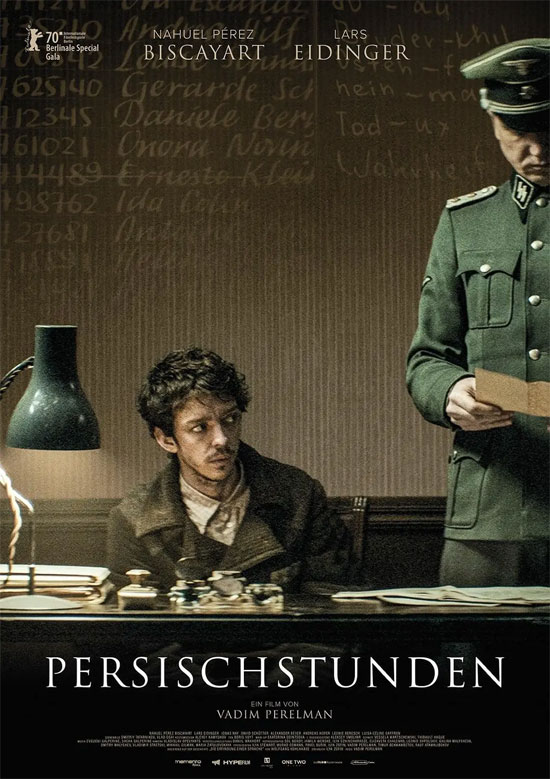
Recommended by a friend as “the best German movie in recent years,” I watched this concentration camp drama, which has some shades of its counterparts The Pianist and Life Is Beautiful, and even a bit of Inglourious Basterds-esque black humor. Basterds-style black humor, but Persischstunden has a very different tone and temperament than past works on the same subject:
Cold and light, always keeping a distance from the camera and restraining emotions, while not forgetting to be rational, reflective and compassionate.
[Friendly reminder: there will be spoilers below]
I created a language to survive.
Persischstunden is on the whole a serious literary film, but it is also commercially popular and not dull.
As the movie opens, a couple of SS men shoot a busload of Jews, and Gilles, the only survivor, panics and claims to be a “Persian” and produces a Persian book to prove it.
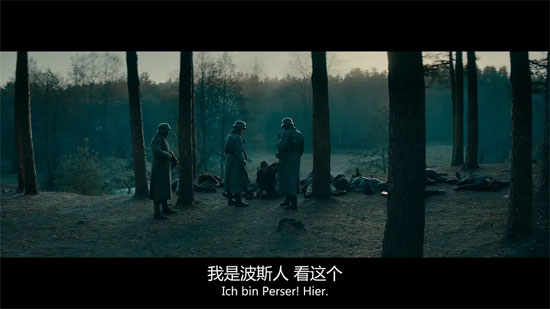
In fact, Gilles is not Persian at all, the book in his hand, just in the car with half a loaf of bread for another Jew (the other side is also stolen) …… But now, he must call the name written in the book “Reza”.
It turned out that Captain Koch in the camp had been trying to find someone to teach him Farsi, and Gilles was able to save his life.
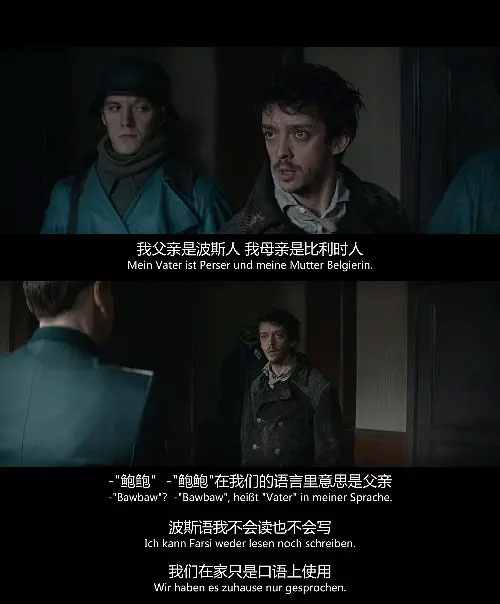
In order to lie and survive, Gilles gave full play to his quick wits and successfully transformed himself into Reza, a Persian who could not read or write, but only speak, by relying on the only word he had just learned.
Of course, Koch won’t simply take “Reza’s” word for it, and the battle between the two men has just begun.
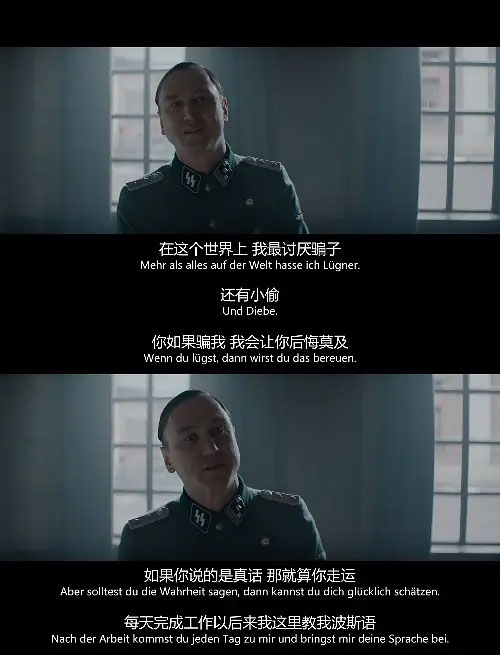
Since his father was a teacher of Judaism, Gilles had some knowledge of the language, and he managed to get through the first night with a few made-up Persian words.
But the Koch, guilty of suspicion, threatened to change his goal of learning four words a day to learning 40 ……
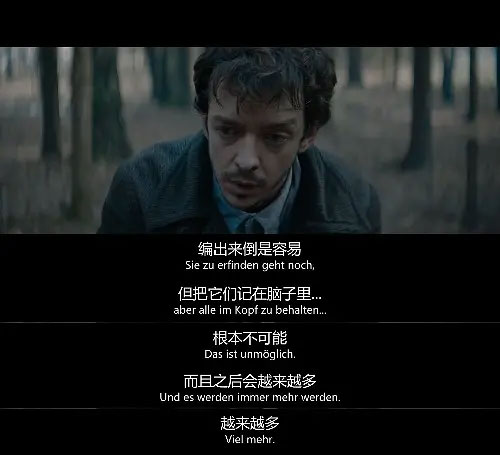
It’s easy to make things up, but it’s hard to memorize them, and it’s only a matter of time before they wear out at this rate.
Just when Gilles was at his wits’ end, the Koch gave him an errand to write and record information about Jews sent to concentration camps.
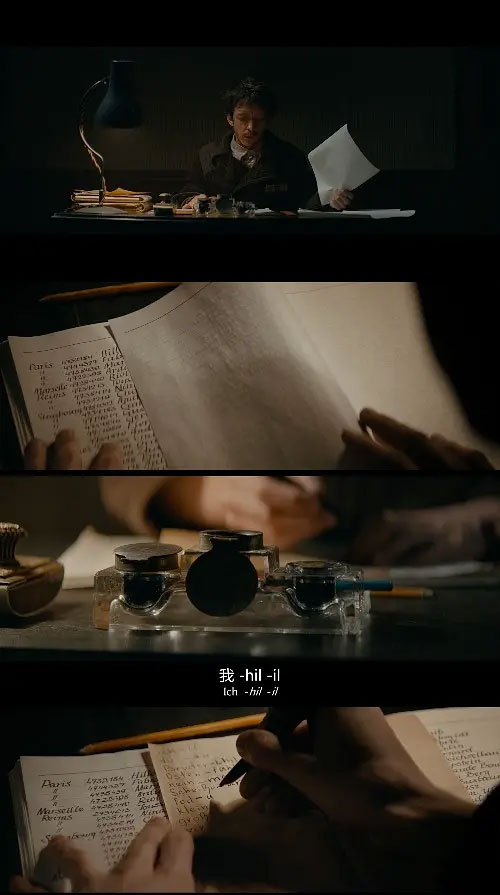
After writing, Gilles looked at his notebook and suddenly had a flash of insight: Yeah, why don’t I just make up words from the names on the list? That way I can memorize all the words by remembering the names!
So Gilles started trying to memorize every name he could get his hands on in the camp ……
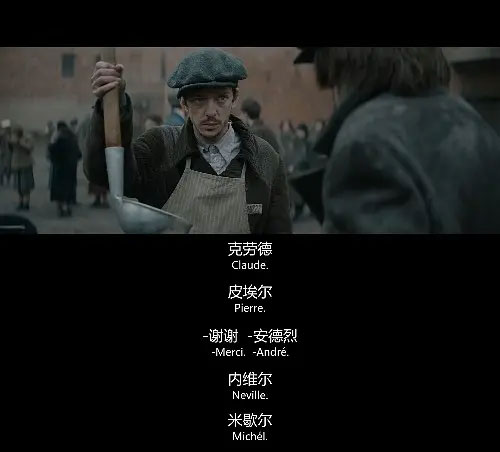
With his unique method and ingenuity, Gilles tricked Koch into learning fake Persian for six months, but because of a slip of the tongue in repeating a word, Koch, who suspected he was being tricked, sent him to the quarry.
High-intensity physical labor and physical and mental torture did not destroy the will of Gilles, he was in a state of near fainting, still speaking Persian that only he and Koch understood ……
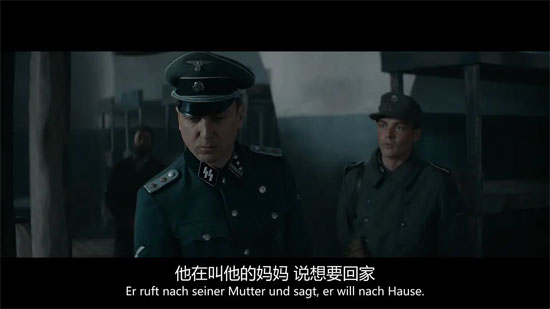
This “subconscious instinct” convinced Koch that he had been wrong about the other man because of a polysemous word – and Gilles was given a second chance.
Returning to the scam, Gilles never made another mistake, and he even took the initiative to let Koch speak to him in “Farsi”.
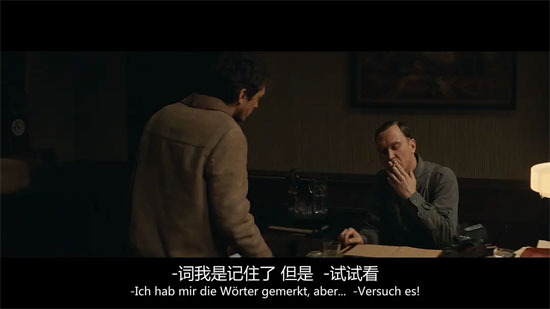
Gilles’ behavior convinced Koch that he had learned Persian well.
When one evening Koch could not help but exclaim, “This is a beautiful language,” the scene of intoxication in a bubble of lies was ridiculous.

But on second thought, the audience can’t help but laugh: the beautiful words Koch speaks are adapted from the names of dead or dying Jews.
Captains and Persians.
One of the things that struck me about Persischstunden was the excellent portrayal of the characters, complex, vivid, and not facetious, the most successful character being Lars Eidinger’s portrayal of Captain Koch.

Koch is a strict to harsh logistics officer in a concentration camp, and his first appearance is a scene in which he teaches his female assistant, Stoffer, a lesson for not writing legibly and neatly enough.
But underneath his harsh, irritable, and small-minded exterior, he thinks he has a reasonable “gentle” side.

However, his gentleness and respect come with a prerequisite, that is, that others meet his requirements one hundred percent of the time.
One might think that Koch’s meticulousness is a virtue, but put it into the context of the management of the Nazi concentration camps, and it’s a bit chilling. ……

Koch’s act of letting Gilles record the list of names shows two things: First, he did not realize that he was admitting that a “lowly alien” could do better than a “noble fellow”; second, he did not take the people on the list seriously, and the names were just characters. The names are just characters.
A fine, ruthless Nazi officer emerges, but there is more to the character than that.

This strict officer, who in the eyes of others has “no flaws/no dead ends,” laughs and tells Gilles about his future plans to open a restaurant in Tehran, to reunite with his brother, to envision a love affair with a young lady, and to talk about his family and his past – he seems to really see Gilles as a kindred spirit. seems to think of Gilles as a dear friend.
Upon sensing that Gilles may be lying, however, Koch immediately changes to a hysterical grimace.

He immediately curses, punches, and kicks his “friend,” no differently than any of his peers.
Koch even went so far as to torture the Jewish liar: it was too cheap to shoot him, he had to be sent to the quarry to do heavy work, and then he instructed Corporal Bayer, who had long been displeased with Gilles, to “take care of him” and to make his life worse than death.

In fact, Koch’s harshness had never changed, and it was only because Gilles was a prisoner who could be beaten and killed that he had no qualms about being violent.
After realizing that he had “wronged” Gilles, Koch downplayed the situation and said that the two should move on.

Note that Koch never apologizes; he only apologizes with soft words and compensation in the form of food and clothing – the two men are never on equal footing, which further completes the image of Koch as shrewd, conceited, and hypocritical.
By contrast, the main character, Gilles, is less sharply layered, and one of the most important things to see in him is the shift in attitude toward his own situation, toward life in the camps, and toward the suffering of his fellow citizens.

In the beginning, he is just a young Jewish man who wants to survive by any means necessary, with some smarts but nothing more to shine.
It is not until he experiences the hardships of the quarry, is treated favorably by the Koch, and continues to feel the trials of his compatriots that Gilles begins to reexamine the life he is living.

He was no longer afraid of the threat of the gun, in addition to being “favored” by the Koch’s emboldened, but more because the fear, anger and numbness has made him indifferent to life and death.
As more and more names are recorded and crossed out, he has a deeper and heavier understanding of these names.

Instead of simply memorizing names and creating words, he would generate specific words based on his impressions of the people in front of him, and the Persian language he passed on to Koch took on a more bloody and vivid meaning.
Gilles gradually widened his vision from himself to all his fellow men, and he did not celebrate his relatively comfortable situation; on the contrary, he felt empathetic pain and compassion for other suffering compatriots.

Thus, Gilles endeavors to help others as much as he can, such as the brothers Marko and Jacob, who also give their lives to help him avoid the crisis of the revelation of the truth.
Later in Persischstunden, the rivalry between the two men, Gilles and Koch, begins to highlight and sublimate the theme.
Gilles no longer grovels, no longer hides his inner resentment and exhaustion, which is his last dignity and candor as a human being;

Koch also does not hide his friendliness and arrogance. He does not want Gilles to be angry and scared, and there is indeed an element of concern for his “friend”, but it is more out of the forcefulness and hypocrisy of “I didn’t kill anyone, I’ve got you covered, you should be happy and thankful”.
It is in this context that the audience reaches the climax of the movie: Gilles prefers to die with the others rather than live, and when Koch finds out and brings him back in spite of military orders, the only argument between the two men breaks out.

“They’re not nameless people, they’re living human beings, and even if you don’t have blood directly on your hands, you’re still a murderer.”
Gilles pokes at Koch’s callousness, self-delusion, and hypocritical artifice, restoring this otherwise non-existent friendship to its original form of bullying and hazing.
A German anti-war film with a lot of flavor and backbone
Compared to other concentration camp-themed films such as Schindler’s List, Life Is Beautiful, and The Pianist, Persischstunden is not too heavily emotional or romanticized, nor does it show much of the suffering of the Jews, and even in the first half of the film, with the exception of a handful of scenes, the The audience doesn’t quite get the sense that the story takes place in a concentration camp ……

It is only in the second half of the movie, along with Gilles’ change of heart, that some “fragmented” details gradually appear, silently and coldly serious, telling the horrors of the past in history.

This is a movie that knows how to “hide”. Most of the words and contents are kept under the surface, but nothing is missing, which is really deep and calm.
The Germans are perhaps more sensitive to how to express their attitudes and positions than creators from other countries, and fortunately, the movie accomplishes this crucial step by portraying Koch.

Koch was indeed a good and capable officer, doing good things and managing political battles, but at the same time he was also clear-thinking and far-sighted enough to see the end of Nazi Germany when the other SS still imagined that the Third Reich could save the day.
So while others were destroying evidence and preparing to retreat, Koch was already packing up his belongings and running away-learning Farsi to get to Tehran was his long-planned way out.

Before running away, Koch used the last of his authority to take Gilles, despite the risks involved.
No matter how you look at it, this behavior is a bit superfluous, Gilles also do not understand why the other party to let him live, after all, there is little love between the two men …… moody Koch answered his doubts: I said I would save your life, I do not want to lose the bet between us.

In fact, this bet is Koch self-centered imposed on Gilles, from which can also be seen to Koch actually proud and conceited to the point.
In the end, Koch loses the bet to Gilles, and the reason he is caught is that his biggest asset is his ability to run away – his inability to speak Farsi.

Koch is representative of a significant number of Nazi war criminals who may not have been so extreme and evil in themselves, but who committed serious crimes in spite of doing their duty, and who should not be able to go free and escape accountability.
The words (names) that pop out of Koch’s mouth symbolize the accusation and judgment of the criminals by their victims.
Names, precisely, are the title of Persischstunden.

The names of nearly 30,000 Jews from the camps, originally recorded, have disappeared with the burning of the incriminating evidence ……
Some viewers may notice a detail: the real name of the hero never appears in the movie from beginning to end (Gilles, as written in this article, is the name in the movie’s material) – as if the dead Jews were like those who came, who existed, but whose names the world failed to leave behind.

Thus, Gilles’ original “Persian” takes on a new meaning: it becomes the proof that those 2,840 Jews really existed.
As Gilles slowly spat out the names of his dead compatriots one by one, his unhurried voice gradually captivated everyone in the Allied shelter, and the unfamiliar yet simple words poked into the hearts of everyone there.

Persischstunden” uses such abstract ‘symbols’ to complete the reflection and indictment of the unjust war, the audiovisual impact is not strong, but also has a thousand pounds of force.
It is a sullen cry of rage and a mournful wail.
Please specify:Anime Phone Cases » Persischstunden 2020 Film Review: With beautiful falsehoods, and with sins to the bone